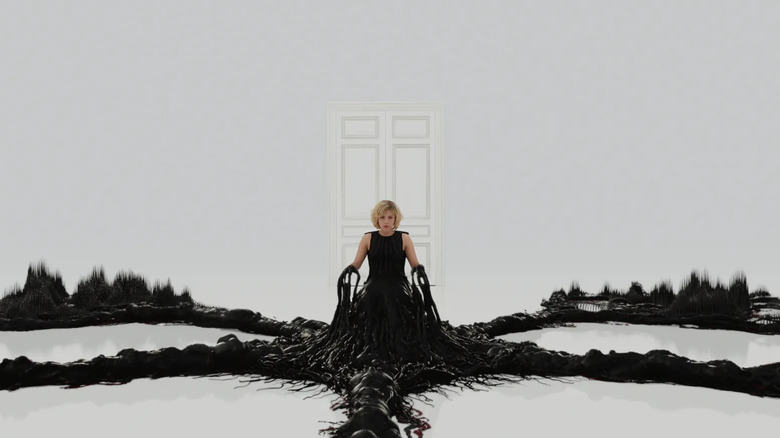Scarlett Johansson’s Polarizing Sci-Fi Action Movie Becomes A Netflix Hit After 11 Years

Luc Besson’s outlandish 2014 sci-fi actioner “Lucy” was a bigger hit than you remember. Modestly budgeted at only $40 million (much of which likely went to the salary of star Scarlett Johansson) and armed with an incredibly ludicrous plot, “Lucy” made over $450 million at the international box office, baffling just about everyone. Critics were merely warm on “Lucy,” giving it largely indifferent and/or vaguely positive reviews. The movie has a 67% critic rating on Rotten Tomatoes (based on 236 reviews), with the words “silly” and “ridiculous” being used a lot to describe it.
Advertisement
As of this writing, “Lucy” is becoming a hit again on Netflix, with /FlixPatrol reporting that the film has ranked among the service’s top 10 movies in the U.S. since (at least) April 15, 2025, on through to April 21. No one can really say why an 11-year-old sci-fi thriller has suddenly grabbed the attention of so many Netflix subscribers, but we might be able to theorize that the movie’s combination of amusing sci-fi ideas, slick action, and a dazzling Hollywood film star will always find an audience. Besson himself has become persona non grata in the movie community due to several accusations of sexual misconduct (paired with the fact that he started dating his second wife when she was 15 and he was 32). The charges against Besson have been dropped due to lack of evidence, but he hasn’t had a hit in a while. His career wasn’t helped by the fact that his 2017 film “Valerian and the City of a Thousand Planets” bombed pretty hard, either.
Advertisement
Regardless, Netflix subscribers are distracted by the glittery flash of “Lucy,” happy to watch Johansson play a woman enhanced by superpower-granting drugs that allow her to kick ass with aplomb. Never mind that the end of the film is, as critics have pointed out, utter nonsense.
Lucy is silly fun
“Lucy” is based on a myth about the human brain that remains frustratingly persistent to this day. You might have heard that human beings only use 10% of their brains, leading to the assumption that the other 90% just needs to be “activated” to unlock our true mental potential. In actuality, we are using all of our brains throughout our lives, and there is no 90% that needs to be “unlocked.” We’re pretty smart as is, provided we keep learning new things. “Lucy” is one of those sci-fi movies that grants its lead character superpowers by merely explaining that they are finally using 100% of their brains. It seems that when we use our whole brains, we can do wild stuff like project our consciousness back in time and bodily evolve into a computer terminal (!).
Advertisement
The story for “Lucy” feels like Besson just made it up on the fly. Johansson plays Lucy, an American traveling in Taiwan who is asked by her boyfriend to deliver a mysterious suitcase. Lucy accidentally discovers that the suitcase contains an eerie new narcotic called CPH4, and a gang of drug dealers forces her to act as a drug mule, implanting the drugs in her body and ordering her to travel to Korea. En route, the drug sacs rupture inside of Lucy, giving her a massive dose. The drug imbue her with superpowers, including the ability to read minds and commit acts of telekinesis. She initially fights the drug dealers and helps some international cops confiscate more of the drugs, but eventually begins to cross some kind of eerie mental line. As she does, Lucy comes to truly see the nature of reality, which inspires her to take more CPH4 deliberately.
Advertisement
Then things get really weird. I won’t reveal the ending, but I implied some of the bizarro things that happen above.
What is Lucy about?
There may be a strange empowerment myth somewhere inside of “Lucy.” After all, it’s about a victimized woman who turns the tables on her captors. The evil kidnappers who would force a woman into being a drug mule couldn’t have predicted that the very drugs they want to sell would turn her into an instrument of justice. But at the same time, “Lucy” also seems to be implying that taking drugs is a really good idea. Remember, kids, if evil criminals offer you an experimental chemical, it will give you superpowers.
Advertisement
“Lucy” came at a time in Johansson’s career when she was starting to seemingly reexamine her place in the pop culture firmament. She had already appeared in a few Marvel Studios movies by 2014 and was becoming an expert at playing “enhanced” non-human roles (superheroes included). Either that or she was cast in projects based on how attractive she is, having her play “the pretty one” in films like “Don Jon” and “He’s Just Not That Into You.” The quality of her performances varies, but movies like “Lucy” tended to stress how much Johansson was commodified as a nonhuman goddess.
Strangely, “Lucy” was released only a few months after Johansson starred in Jonathan Glazer’s sci-fi film “Under the Skin.” In that film, Johnasson plays a space alien who had taken the skin of a human woman and uses the attractiveness of that human to sexually lure men into a bizarre alien netherspace where they are consumed and used as fuel. The alien became acutely aware that it looked like Scarlett Johansson and ponders why humans react to a body that looks like that. Johansson was deconstructing her own image with the film, confronting the way her body is so often commodified.
Advertisement
Perhaps “Lucy,” despite how silly it is, is another attempt by the actor to force audiences to examine their own habits of objectifying her. She is not a body any longer. She is the world’s largest mind.
Source link








